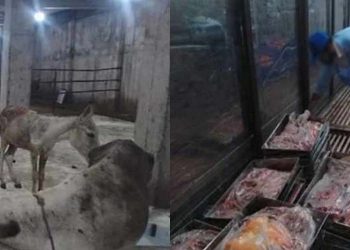The level of food security is worsening in Pakistan according to both the Global Hunger Index (GHI) 2021 and World Food Program. As per the Global Hunger Index for 2021, Pakistan ranks 92nd out of the 116 countries with a score of 24.7 which means that hunger has reached a ‘serious’ level. From 2000 to 2021, our GHI scores have been steadily declining by 32.7% when it was 36.7 in 2000.
However, the proportion of the total population experiencing undernourishment has shown only minor improvement from 41.4% in 2000 to 37.6% in 2021. Also, the 2018 National Nutritional Survey reported that 36.6% of the total population of Pakistan faced food insecurity. Alarmingly, the World Food Program (WFP) reveals that 40% of children from the age of 6 to 59 months suffer from chronic malnutrition.
The WFP attributes the level of food insecurity in Pakistan to limited economic access by the poorest and most vulnerable group of the population, especially women, to a satisfactory and diverse diet. The 2018 National Nutritional Survey also indicates that the second-highest rate of malnutrition in the region with 18% of children under 5 suffering from acute malnutrition, about 40% of the children in the same age group experiencing stunted growth, and 29% are underweight. Furthermore, all complementary feeding indicators are far below acceptable levels, only one in seven children aged 6–23 months receives a meal with minimum dietary diversity, with at least four different food groups, and around 82% of children don’t receive the minimum recommended number of the meals a day.
It’s worth noting that the average Pakistani household spends 50.8% of its monthly income on food making them vulnerable to numerous shocks like high food prices. Double-digit food inflation since mid-2019 has adversely impacted poorer classes of Pakistan but now hitting hard the middle class. Many experts believe the primary causes of price increases are stagnant and fluctuating agriculture productivity, inefficient use of key natural resources particularly water, and limited innovation, coupled with weather-related shocks. Back in April 2019, an article published by Future Directions International, an Australian research institute stated that “Pakistan is the 16th most vulnerable country to the effects of climate change and different parts of Pakistan are subject to different risks. Northern parts of the country face snowstorms, landslides, and floods. Coastal areas are prone to cyclones and floods. Floods are also the main risk in central Pakistan, while southern Punjab, Sindh, and Baluchistan are prone to drought.”
Addressing the issue of food inflation in Pakistan, a World Bank blog posted a few weeks ago titled “Four actions to address food inflation in Pakistan” suggested four recommendations to tackle food inflation. The first recommendation is reforming the wheat procurement system reducing the Government’s footprint in the market by leaving it to the private sector to buy, sell, store, and import wheat. The authors advocate a limited role of the government to just maintaining a strategic wheat reserve for emergencies and price stabilization when prices surpass a tolerable range.
The second suggestion is to enhance competition in the sugar sector as sugar production levies major costs on the economy because of high consumer prices, inefficient production, and the substantial use of water which is increasingly scarce in Pakistan. The authors recommend the liberalization of imports and the removal of barriers to entry to the establishment of new mills to increase competition in the sugar sector.
The third recommendation is developing government policies that promote high-value, climate-smart agriculture like dairy, fresh produce, cotton, and livestock products. Furthermore, upgrading agricultural research for introducing new crops and crop varieties, more efficient production and climate-smart techniques, and better control of pests and diseases, would help revive productivity growth.
The fourth and final suggestion by the authors entails improvements in monitoring, forecasting, and coordination. Government policy decisions must be based on a monitoring of the food system that tracks changes in global supply and demand, currency movements, local production and consumption, and public and private stocks.
The Holy Quran and the Sunnah also guide us about food security. We know that food is a necessity as every person needs a certain amount daily to sustain themselves and the Holy Prophet Muhammad (SAW) stated, “Whosoever finds the day feeling secured in his family, healthy in his body and possessing provision for his day, it is as though he possessed the whole world.” (Tirmidhi)
Nowadays, it’s popular to talk about a global food crisis but on the contrary, Allah (SWT) informs us in the Quran that this isn’t so, “He placed on the earth firm mountains, standing high, showered His blessings upon it, and ordained ˹all˺ its means of sustenance—totaling four Days exactly—for all who ask.” (Surah Fussilat Ayat 10). Therefore, Allah (SWT) is telling us food is available but we must make efforts to produce it and to distribute it equally. Various statistics support this Ayat like the world’s farmers produce enough food to feed more than 1.5x the current population and that from 1992 to 2009, food production increased by 45% while population growth was 26% during this period.
Islam places importance on agriculture and arable land by increasing production through technology, techniques, and science and expanding land for cultivation. Our Nabi (SAW) encouraged the revival of barren land, “Whoever revives a barren land, then it belongs to him” (Sahih al-Bukhari). This means that the State should provide land for agriculture to those who possess little or no land and can farm it. For instance, the Prophet (SAW) granted vast land from between the sea and rock formations to Bilal-Al-Muzni.
Moreover, Islam encourages both the state and individuals to store food like wheat, grains, dried dates, and other food items. In a hadith, Aisha (RA) reported that our Nabi (SAW) said “A family which has dates will not be hungry” (Sahih Muslim). Muslims used to reserve the dates during the days of the Prophet (SAW).
Our Nabi (SAW) also advised us to eat little, “A disbeliever eats in seven intestines and Muslim eats in one intestine”. A Muslim should eat to live and not live to eat. Also, the Prophet (SAW) said, “The food for one person is sufficient for two, and the food of two persons is sufficient for four persons and the food of four persons is sufficient for eight persons.”
Islam outlaws hoarding for hiking prices as the Prophet stated, “Whosoever was involved in any of the prices of the Muslims, so as to increase it for them, it would be due on Allah to place him in a great fire at the Day of Judgment.” But sadly, in Pakistan, this is common due to the failure of price control mechanisms.
The State and individuals must ensure equal distribution of food both in quantity and quality as directed by Allah (SWT) in the Quran, “So that wealth may not merely circulate among your rich.” (Surah Al-Hashr Ayat 7). Our Nabi (SAW) explained to us that feeding others is an obligation for Muslims, “He would not have believed in me, the one who slept with his stomach full when his neighbor was hungry on his side and he knew that.” And “In any local community, if there became amongst them a hungry person, Allah’s protection will be disassociated from them.”






























